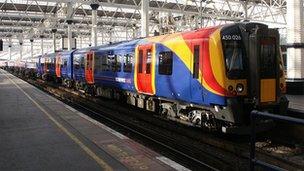Network Rail's Wessex route to get £1bn investment work
- Published

More than £1bn is to be spent on the rail network in the South and South West, under new plans announced by Network Rail.
Improvements on the Wessex route from London Waterloo include track renewals and signalling enhancements.
The rail company also said it aims to safeguard the route against the impact of changing weather patterns including flooding.
The plans are part of Network Rail's five-year business plan for 2014-19.
'Trade-offs'
A new £50m signalling centre will be created at Basingstoke as part of a long-term strategy to save £250m annually across the railway in signalling costs, the rail firm said.
The banks at each side of the rail line at Honiton, Crewkerne and Gillingham will be stabilised to improve their strength during heavy rainfall.
Nationally, there will be 20% more seats on trains going into London during the morning rush hour.
By 2019, there will be an extra 115,000 seats, bringing the total up to 654,000.
Other plans announced by Network Rail include a £300m investment to increase capacity into London Waterloo, including platform extensions for longer trains.
Anthony Smith, chief executive of watchdog Passenger Focus, has welcomed the proposals but said passengers would expect disruption caused by the works to be kept to "a minimum" and information about timetable changes to be provided "well in advance".
Tim Shoveller, managing director for Network Rail and South West Trains Alliance, has warned there will be "trade-offs" in order to deliver the plans.
"As passenger and train numbers rise, the number of challenges increase and it becomes more complex than ever to run a reliable and cost-effective railway," he said.
"As a result, we have entered an era of trade-offs and will increasingly have to balance the need to build and renew more infrastructure, run trains on time and reduce costs."
Mr Smith said: "The plans assume fares will continue to increase above the rate of inflation, which will be a concern to passengers who have already faced 10 years of ticket prices rising faster than the cost of living."
- Published8 January 2013
- Published8 January 2013
- Published7 January 2013
- Published19 December 2012
- Published26 November 2012
- Published20 February 2011
- Published13 October 2012
- Published25 July 2012